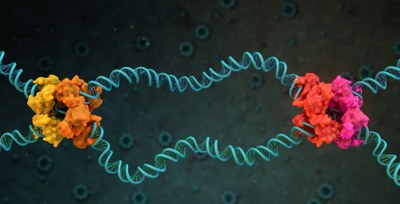Medical Systems Biology
The Buchholz group conducts research in the fields of functional genomics and genome editing. We aim to identify, functionally characterize and repair disease-relevant genes using various genetic tools (such as RNAi, CRISPR/Cas and Designer-Recombinases).
Genome sequencing has shown that cancer mutations are patient-specific. Therefore, each cancer genome has its individual genetic fingerprint. The Buchholz laboratory develops technologies to discover, study and eliminate cancer-driving mutations, thus improving individual cancer therapies as well as advancing the current options for personalized medicine. Massive parallel sequencing has provided the means to rapidly identify all mutations that are present in a tumor. Nevertheless, it is frequently not known, which of these mutations are actually driving the disease. Genomic tools, such as RNA interference have enabled the comprehensive analyses of cancer genomes allowing genome-wide loss-of-function studies in a wide spectrum of organism. Hence, it is now feasible to probe the function of each gene in cells by genome-wide RNAi screens. In addition, CRISPR/Cas9 is one of the most revolutionary tools in biotechnology.
Our laboratory has developed this technology to specifically cleave DNA at sites that are mutated in cancer cells. In addition, we are performing large-scale CRISPR screens in primary patient material, e.g. cancer cell lines and established cancer organoids, to functionally dissect cancer mutations. Another focus of the laboratory is the development of genome editing tools for precision genome surgery. By applying state of the art technologies, Designer-Recombinases and other genome editing tools with therapeutic potential are developed and tested in vitro as well as in vivo.

Methodology
- Site-specific recombination
- Directed molecular evolution
- CRISPR/Cas9 technology
- Long read PacBio sequencing
- Nanopore sequencing
- Large scale RNAi/CRISPR screens
- BAC-tagging
- Live cell microscopy
- Organoid culture
- Deep-Learning/KI
Contact
Prof. Dr. Frank Buchholz
Group Leader Medical Systems Biology
Faculty of Medicine Carl Gustav Carus, TU Dresden
Phone: +49(0)351/463-40277
Email: frank.buchholz@tu-dresden.de
Sürün, D., Schneider, A., Mircetic, J., Neumann, K., Lansing, F., Paszkowski-Rogacz, M., Hänchen, V., Lee-Kirsch, M.A., Buchholz, F.
Efficient Generation and Correction of Mutations in Human iPS Cells Utilizing mRNAs of CRISPR Base Editors and Prime Editors.
Genes (Basel)May 6;11(5):511. doi: 10.3390/genes11050511. (2020)
Sayed, S., Paszkowski-Rogacz, M., Schmitt, L. T. and Buchholz, F.
CRISPR/Cas9 as a tool to dissect cancer mutations.
Methods 164-165: 36-48. (2019)
Camgoz, A., Paszkowski-Rogacz, M., Satpathy, S., Wermke, M., Hamann, M. V., von Bonin, M., Choudhary, C., Knapp, S. & Buchholz, F. (2018)
STK3 is a therapeutic target for a subset of acute myeloid leukemias.
Oncotarget, 9(39), 25458-25473. doi:10.18632/oncotarget.25238 (2018)
Mircetic, J., Dietrich, A., Paszkowski-Rogacz, M., Krause, M. & Buchholz, F.
Development of a genetic sensor that eliminates p53 deficient cells.
Nat Commun, 8(1), 1463. doi:10.1038/s41467-017-01688-w (2017)
Gebler, C., Lohoff, T., Paszkowski-Rogacz, M., Mircetic, J., Chakraborty, D., Camgoz, A., Hamann, M. V., Theis, M., Thiede, C. & Buchholz, F.
Inactivation of Cancer Mutations Utilizing CRISPR/Cas9.
J Natl Cancer Inst, 109(1). doi:10.1093/jnci/djw183 (2016)


